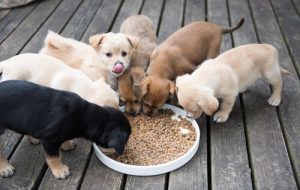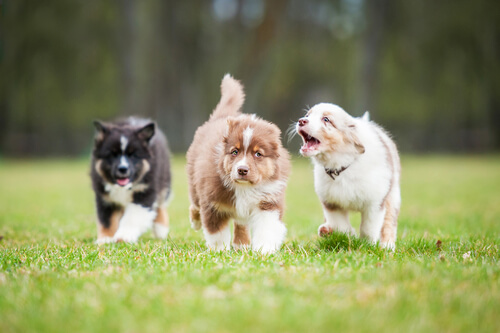Tips and Guidelines for Feeding Puppies


Written and verified by the lawyer Francisco María García
For the first 45 days, the most appropriate food for puppies is their mother’s breast milk. Once this stage is over, you will need to wean the puppies off the breast milk by beginning to give them other types of food. It’s important to remember that dogs grow very quickly. You have to prepare for these changes ahead of time.
Feeding Puppies is Very Different Than Feeding Humans

All vets agree that puppies and dogs in general can’t eat the same diet as people. You must not forget that some human foods are harmful and toxic both to dogs and other animals.
Along with the type of food, you’ll need to take other aspects into account as well, such as the quantity and frequency at which you feed them, which will vary as they grow up.
- In the first four months, puppies can have up to four or five feedings a day.
- Little by little, they will cut it down to three.
- Finally, the dog will end up eating twice a day in a 24 hour period, like all adult dogs should.
Feeding Puppies Breast Milk
As you can see, breast milk is essential for the first days of a puppy’s life. Puppies should be with their mothers the first 45 days of lactation, so that their mothers can provide the nutrients that the newborn animals will need.
If, for whatever reason, it’s not possible for the puppies to have breast milk, you would have to look for a good puppy formula in a pet store. In any case, to find out what to do, the best option is always to consult a trusted veterinarian.
Tips for Feeding Puppies
- As we’ve discussed, homemade food is not ideal for a puppy’s nutritional needs. Continued use of homemade food in a puppy’s diet can cause deficiencies or excesses of certain nutrients that could ultimately reduce the animal’s quality of life.
- You must keep in mind that some human foods are toxic to puppies, and to animals in general.
- Chemical-free dog kibble is the ideal food for when a puppy stops drinking breast milk. These foods contain the balanced amount of vitamins, fiber and protein that puppies need to be happy and healthy at every stage of their lives.
- The best dog kibble depends on the dog’s age. A puppy’s diet will vary according to how quickly his body matures. That’s why it’s so essential to find dog food that’s chemical-free and instead contain probiotics and vitamins, since these things strengthen their immune system and protect their bacterial flora.
- When puppies get to six months, they phase out of the puppy stage and begin to turn into “teenagers,” almost adult dogs. During this time, they need to take in enough calcium and phosphorus. Even though they are matured, they are still growing and need nutrients to strengthen their bones.
- Hydration is another fundamental point. Puppies need constant hydration to be healthy. Your dog’s bowl should always have fresh, clean water. It’s also vital that you stay on top of sanitizing their bowls and feeding areas.
The Ideal Amount of Food

Don’t give puppies too much food. Too much could damage their digestive system and cause excessive amounts of pressure to be exerted on their skeletal system, among other issues. Gaining a lot of weight in a short amount of time is not going to be good for them.
To find out the proper amount of food to give puppies, start by looking on the back of the dog food bag, or in the manufacturer’s instructions.
There is not a standardized amount of food all puppies, but it will depend on their age, breed, physical activity, etc. Periodically weigh your puppy to make sure they’re the right weight for their age, size and breed.
Food and Exercise
Do not feed your puppy immediately before or after exercise or physical activities. It’s best to leave an hour in between your puppy’s meals and their exercise. Actually, it’s good habit for dogs to rest for a while after eating. This will keep their stomachs from hurting.
This text is provided for informational purposes only and does not replace consultation with a professional. If in doubt, consult your specialist.